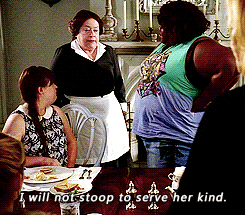Season three of American Horror Story begins with the introduction of a brutal monster- Delphine Lalaurie, an eighteenth century slaveholder who mercilessly mutilates her slaves. Not only does she regularly harvest her slaves’ organs to create an anti-aging face cream, she also performs sick experiments with their bodies. For one of her experiments, she transformed a man into a minotaur by sewing a bull’s head to him (Would Carroll consider him to be a monster?). Unfortunately for Delphine, however, this man was the lover of Marie Laveau, an immortal voodoo queen. To punish Delphine for her evils, Laveau curses her with immortality and then buries her in a tomb where she is meant to spend the rest of eternity.
In 2013, however, eternity is cut short when Delphine is prematurely exhumed by a witch named, Fiona Goode. Fiona operates a school of witchcraft and employs Delphine as a servant to her three students: Zoe, Madison, and Queenie. So that you may fully appreciate the irony, I will also tell you that Queenie is African American. Delphine is, to say the least, vocal about her unwillingness to serve Queenie, but this changes as the season progresses. As Delphine becomes acquainted with Queenie, she begins to recognize the evil she had done in the past and makes an active attempt to become a better person. Delphine and Queenie, in fact, form a beautiful friendship, each willing to risk her life for the other.

This is before Delphine changes her racist ways.
This was a beautiful turn of events, but also the beginning of my confusion. Marie Laveau learns that Delphine was exhumed and begins to enact her revenge. She kidnaps Delphine and tortures her just as Delphine had tortured her slaves. This should be satisfying to watch, right? Wrong! I actually found it very difficult to not have sympathy for Delphine. This is because she had become a better person and so desperately wanted to prove this, especially to Queenie. Delphine’s situation raises some questions, such as: Can a monster really change and better itself? And, if so, can it ever be truly deserving of our sympathy?


